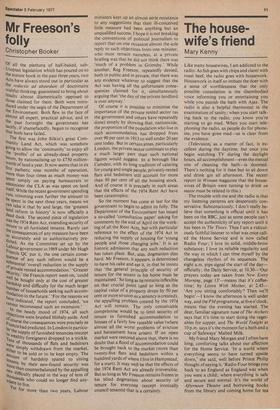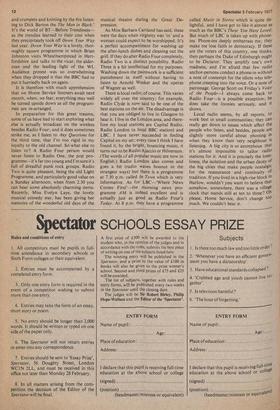The house wife's friend
Mary Kenny
Like many housewives, I am addicted to the radio. As fish goes with chips and claret with roast beef, the radio goes with housework. Housework in itself so imbues the doer with a sense of worthlessness that the only possible consolation is the disembodied voice informing you or entertaining you while you punish the bath with Ajax. The radio is also a helpful thermostat in the examination of sanity; when you start talking back to the radio, you know you're starting to go mad. When you start telephoning the radio, as people do for phoneins, you have gone mad—as is clear from the evidence.
(Television, as a matter of fact, is excellent during the daytime, but once you begin watching TV during the daylight hours, all accomplishment—even the menial one of cleaning the bath—is doomed. There's nothing for it then but to sit down and drink gin all afternoon. The recent report in Woman magazine that the housewives of Britain were turning to drink en masse must be related to this.) The trouble with me and the radio is that my listening patterns are desperately conservative. Subconsciously, I don't really believe that something is official until it has been on the BBC, just as some people can't accept the authenticity of any report until it has been in The Times. Thus I am a ridiculously faithful listener to what was once called the Home Service and is now called Radio Four; I love its solid, middle-brow substance; 1 love its reliable regularity and the way in which I can time myself by the changeless rhythm of its sequences. The eight a.m. pips signal the start of the day— officially; the Daily Service, at 10.30—'0ur prayers today are taken from New Every Morning, page 13'—means that it's' coffeetime; by Listen With Mother, at 2.45— 'Are you sitting comfortably? Then we'll begin'—1 know the afternoon is well under way, and the PM programme, at five o'clock, means that the evening has started. The dear, familiar signature tune of The Archers says that it's time to start doing the vegetables for supper, and The World Tonight at 10 p.m. says it's the moment for a bath and a cup of Safeways' Malted Milk.
My friend Mary Morgan and I often have long, comforting talks about our affection for the Home Service. 'In a world where everything seems to have turned upside down,' she said, well before Prince Philip thought of saying it, 'Radio Four brings you back to an England as England was when you were a child; where everything is safe and secure and normal. It's the world of Afternoon Theatre and borrowing books from the library and coming home for tea
and crumpets and knitting by the fire listening to Dick Barton the The Man in Black.' It's the world of BT—Before Trendiness— as the trendies learned to their cost when they precipitately took off Down Your Way last year. Down Your Way is a lovely, thoroughly square programme in which Brian Johnston visits Wheathampstead in Hertfordshire and talks to the vicar, the alderman and the leading •light of the WI. Audience protest was so overwhelming when they dropped it that the BBC had to put it hurriedly back on again.
It is therefore with much apprehension that we Home Service listeners await next month, when, we fear, everything may well be turned upside down as all the programmes are re-arranged.
In preparation for this great trauma, some of us have had to start exploring what , else is actually broadcast on the wireless besides Radio Four; and it does sometimes strike me, as I listen to Any Questions for the third time, that I'm too rigid in my loyalty to the old channel. So what else to listen to? A Radio Four person would never listen to Radio One, the pop programme—it's far too young and I'm sure it's full of dreadful punk rock groups. Radio Two is quite pleasant, being the old Light Programme, and particularly good value on a Sunday afternoon, when from 2.30 you can hear some absolutely charming items. Recently, Miss Evelyn Laye, the lovely musical comedy star, has been giving her memoirs of the wonderful old days of the
musical theatre during the Great Depression.
As Miss Barbara Cartland has said, these were the days when virginity was 'in' and a woman could expect to be worshipped. It's a perfect accompaniment for washing up the after-lunch dishes and cleaning out the grill. If they do alter Radio Four completely, Radio Two is a distinct possibility. Radio Three is a bit intellectual for my purposes. Washing down the paintwork is a sufficient punishment in itself without having to listen to Arnold Wesker and the operas of Wagner as well.
There is local radio, of course. This varies widely all over the country; for example, Radio Clyde is now said to be one of the best stations on the air. The disadvantage is that you are obliged to live in Glasgow to hear it. I live in the London area, and therefore my local stations are Capital Radio, Radio London (a local BBC station) and LBC. I have never succeeded in finding Capital on my set ; every time I think I have found it, by the bright, bouncing music, it turns out to be Radio Ajaccio or Hilversum. (The words 6f all popular music are now in English.) Radio London also comes and goes a bit (radio waves bounce in the strangest ways) but there is a programme at 7.30 p.m. called In Town which is very informative. As for LBC—'Where News Comes First'—the morning news programme AM is indeed excellent and is actually just as good as Radio Four's Today. At 8 p.m. they have a programme called Music in Stereo which is quite delightful, and I have got to like it almost as much as the BBC's These You Have Loved. But much of LBC is taken up with phoneins. Phone-ins deeply embarrass me; they make me lose faith in democracy. If these are the voters of this country, one thinks, then perhaps the Duke of Edinburgh ought to be Dictator. They amplify one's own madness, and I'm afraid that few radio anchor-persons conduct a phone-in without a note of contempt for the idiots who telephone creeping into the voice. Or a note of patronage. George Scott on Friday's Voice of the People—I always come back to Radio Four—is a possible exception; he does take the loonies seriously, and it shows.
Local radio seems, by all reports, to work best in small communities; they can really get down to issues which affect the people who listen, and besides, people are slightly more careful about phoning In when they know their very neighbour is listenkng. A big city is so amorphous that it's almost impossible to tailor radio stations for it. And it is precisely the loneliness, the isolation and the urban decay of the big cities that make people nostalgic for the reassurance and continuity 01 tradition. If you lived in a high-rise block In Harlow, wouldn't you want to believe that somehow, somewhere, there was a village clock that stands still at ten to three ? 011 please, Home Service, don't change too much. We couldn't bear it.



































 Previous page
Previous page